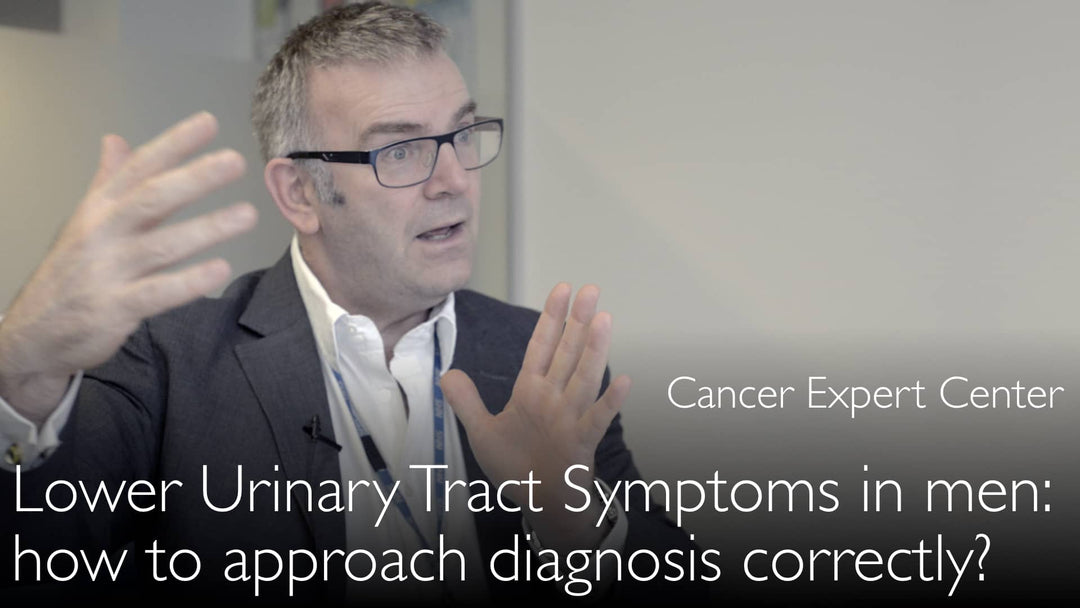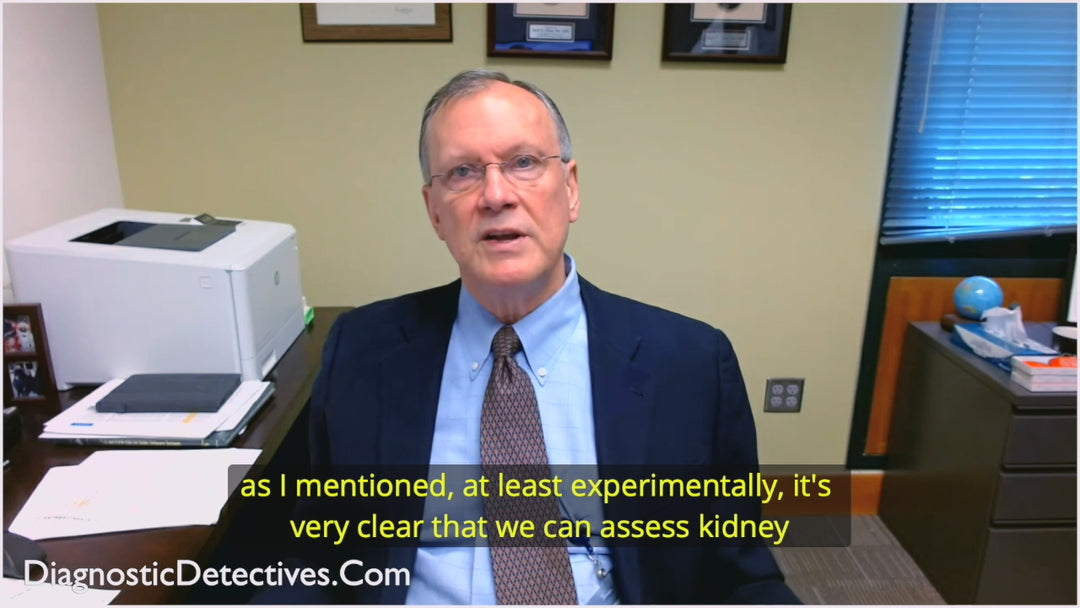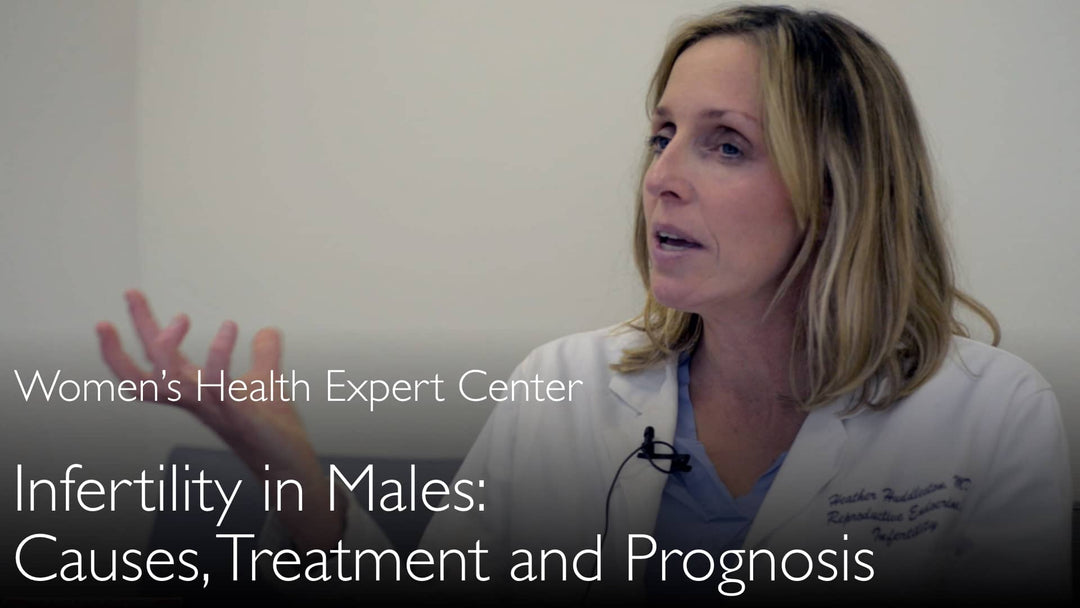Leading expert in urology and prostate diseases, Dr. Mark Emberton, MD, explains how to correctly diagnose and treat lower urinary tract symptoms (LUTS) in men. He details the multifactorial causes of LUTS, from kidney function and bladder instability to prostate enlargement, and outlines a practical diagnostic approach using ultrasound and bladder diaries. Dr. Mark Emberton, MD, emphasizes that lifestyle modifications and targeted medications can resolve symptoms for most patients, with surgery reserved for severe cases where bladder function is compromised.
Diagnosis and Treatment of Lower Urinary Tract Symptoms (LUTS) in Men
Jump To Section
- Understanding the Multifactorial Causes of LUTS
- Core Bladder Functions and LUTS Diagnosis
- Initial Diagnostic Evaluation for LUTS
- Key Diagnostic Tests: Ultrasound and Bladder Diary
- LUTS Treatment Options: From Lifestyle to Medication
- Surgical Treatment for Severe LUTS
- Expert Insights on Managing LUTS
Understanding the Multifactorial Causes of LUTS
Lower urinary tract symptoms in men are extremely common, affecting up to 40% of men aged 40 and older. As Dr. Mark Emberton, MD, explains, LUTS arise from a broad, multifactorial basis rather than a single cause. Dr. Mark Emberton, MD, describes how the entire urinary system can contribute to symptoms. Neurological factors, like cognitive dysfunction or degenerative diseases, can impair the brain's awareness of bladder fullness. Spinal cord injuries can make the bladder become overactive.
Dr. Mark Emberton, MD, notes that kidney function also changes with age. Older kidneys are less able to concentrate urine at night, a process regulated by antidiuretic hormone (ADH). This leads directly to nocturia, or frequent urination at night. The bladder itself undergoes changes; its wall thickens, becomes unstable, fills with scar tissue, and develops hernias, causing it to lose its contractile strength. Finally, prostate enlargement and obesity can alter the anatomy of the lower urinary tract, increasing resistance to urine flow.
Core Bladder Functions and LUTS Diagnosis
The core issue in lower urinary tract symptoms diagnosis is determining which of the bladder's two primary functions is most affected. Dr. Mark Emberton, MD, clarifies that the urinary system must both store urine at low pressure and expel it efficiently and completely. Most patients with LUTS have a combination of storage problems (like urgency and frequency) and voiding problems (like a weak stream and hesitancy). It is very rare to find a patient with only an outlet problem from prostate enlargement.
The key to treatment is directing therapy at the dominant dysfunctional process. This requires a careful diagnostic workup to discriminate between a failure to store urine properly and a failure to empty the bladder effectively. Understanding this distinction allows for targeted and more successful management of lower urinary tract symptoms.
Initial Diagnostic Evaluation for LUTS
The initial step in evaluating a patient with LUTS is to rule out serious underlying conditions. Dr. Mark Emberton, MD, emphasizes that the goal is to ensure there are no complicated urological problems. This involves checking for signs of a urinary tract infection, blood in the urine (hematuria), or other red flags that might indicate bladder cancer or stones.
Fortunately, as Dr. Mark Emberton, MD, points out, these complicated issues are found in a very small minority of patients—only about 2%. The overwhelming majority of men who present with symptoms are diagnosed with uncomplicated, or benign, lower urinary tract symptoms. This initial screening is crucial for guiding the subsequent, more focused diagnostic tests and ensuring patient safety.
Key Diagnostic Tests: Ultrasound and Bladder Diary
Dr. Mark Emberton, MD, relies on two key diagnostic tests to gain extraordinary insight into the cause of a patient's LUTS. The first is a bladder ultrasound scan performed after the patient urinates. This post-void residual (PVR) volume test measures how well the bladder empties, identifying retention issues.
The second, and equally important, test is a 3-day bladder diary. Dr. Mark Emberton, MD, finds this invaluable for understanding functional bladder capacity and patterns throughout the day and night. It records the volume and timing of each urination. Dr. Emberton provides a striking example: a patient who swore he wasn't drinking excessively was actually producing 5.5 liters of urine per day. This meant he was urinating large volumes on the hour, every hour, a problem solved simply by reducing fluid intake. The diary provides objective data that is often more reliable than a patient's subjective recall.
LUTS Treatment Options: From Lifestyle to Medication
Treatment for lower urinary tract symptoms is directed by the diagnostic findings and is often successful without drugs. Dr. Mark Emberton, MD, states that the first step is to understand what is going on and implement lifestyle changes. For the patient producing 5.5 liters of urine, the treatment was simply to drink less fluid, particularly in the evening.
When lifestyle modifications are insufficient, targeted medications are used. To calm an overactive and unstable bladder, anticholinergic or beta-3 agonist drugs can be prescribed. To relax the prostate and reduce outlet resistance, alpha-blockers are effective. For men with a significantly enlarged prostate, 5-alpha reductase inhibitors can be used to medically shrink the gland over time. Dr. Mark Emberton, MD, notes that this stepwise approach solves lower urinary tract symptoms for the majority of patients.
Surgical Treatment for Severe LUTS
Surgical intervention becomes necessary for the minority of patients whose lower urinary tract symptoms do not respond to conservative and medical management. Dr. Mark Emberton, MD, explains that these are typically patients who cannot urinate at all or who have bladders that are wrecked and very weak from long-term obstruction.
The goal of surgery is to reduce the bladder's exit resistance, making it easier to empty. This is most commonly achieved through procedures like transurethral resection of the prostate (TURP) or laser prostatectomy. The success rate of these operations is high, ranging from 70% to 90%, but it is heavily dependent on how well the bladder muscle itself is still functioning prior to the procedure.
Expert Insights on Managing LUTS
In his discussion with Dr. Anton Titov, MD, Dr. Mark Emberton, MD, provides a comprehensive framework for managing a condition that affects a huge portion of the aging male population. His approach is systematic, starting with a thorough investigation to understand the unique contributors to each patient's symptoms.
The insights from Dr. Emberton highlight that effective treatment is not one-size-fits-all. It requires a careful diagnosis to determine if therapy should be directed at the bladder, the prostate, or the patient's habits. This nuanced strategy, combining diagnostic precision with a stepped treatment plan, offers hope and effective solutions for the millions of men experiencing lower urinary tract symptoms.
Full Transcript
Dr. Anton Titov, MD: Lower urinary tract symptoms in men are common after age 40. How to diagnose and treat LUTS? Weak urinary bladder, enlarged prostate, and decreased kidney function cause lower urinary tract symptoms.
Forty percent of men 40 years of age or older experience lower urinary tract symptoms (LUTS). They go to see a urologist or general practitioner. What is a typical diagnostic path and diagnostic tests to identify the cause of lower urinary tract symptoms?
Dr. Mark Emberton, MD: Lower urinary tract symptoms are extremely common. They are multifactorial. I think lower urinary tract symptoms arise from a broad basis. Some of it is the nervous system deteriorating.
I’ll start from the top. Obviously, if you have cognitive dysfunction, you might not be aware when your bladder is filling. You might not be aware of the sense, the urge to urinate. We know that some neurological degenerative diseases affect the way the urinary bladder functions.
If you have a spinal cord injury, your bladder becomes much more active. Then we focus on your kidneys. As you age, the kidneys are less able to concentrate urine at night.
This means that if you drink tea, wine, or beer in the evening, you're more likely to get up at night to urinate. You might see a patient who reports that he's getting up three times a night now to urinate, whereas 10 years ago he wouldn't get up at night at all. Much of that is this inability of kidneys to concentrate urine.
There is a substance called ADH that is secreted from the kidneys. Then we get down to the urinary bladder. The bladder wall thickens. It becomes more unstable.
The urinary bladder wall fills with scar tissue. It develops hernias over time. So the urinary bladder loses its oomph.
When you want the urinary bladder muscle to contract, it doesn't contract as well as it did. And then you've got the enlarging prostate. Then maybe you've got obesity, which changes the shape of the lower urinary tract.
All these things can affect the two functions. One is to store the urine in the bladder at low pressure. The second function is to expel it efficiently in one go.
The key to the lower urinary tract symptoms diagnosis is to find out which of those two processes dominate. They are usually shared. It's very rare to find somebody with lower urinary tract symptoms who just has an outlet problem.
Dr. Anton Titov, MD: And the tests try and discriminate between those two causes of lower urinary tract symptoms.
Dr. Mark Emberton, MD: So what I tend to do is make sure that there's no complicated aspect to this, no urological problems, no sign of infection, no sign of blood in the urine. That happens in very few patients, about 2%. The rest of patients have uncomplicated lower urinary tract symptoms.
Then I tend to do two tests. One diagnostic test is to establish how well the bladder empties. That's an ultrasound test.
Then I do another test. I ask the patient to keep a diary over three days. This gives me some idea of their functional capacity.
It shows how the bladder works over a day and a night. It is really important how much urine a patient puts out in the 24-hour period. It was quite amazing.
I saw a patient yesterday who swore to me that he wasn't drinking too much water, and yet he was producing 5.5 liters of urine per day. Most of us pass at best 400 to 500 milliliters of urine. So he was passing 5 liters a day.
He was having to urinate half a liter 10 times a day. Remember, he's asleep for a third of the day or half the day. So he was urinating on the hour every hour.
All he needed to do is to drink less, because his bladder was working perfectly and emptied very well. So these two diagnostic tests give you an extraordinary insight into lower urinary tract symptoms.
Then you direct your therapy at the bladder, at the prostate, at the individual. Normally we can get away without using any drugs. We have to understand what's going on.
We have to use lifestyle changes to improve lower urinary tract symptoms. Then sometimes we might need to calm the urinary bladder down with medication. Sometimes we might need to relax the prostate with medicine.
Sometimes we might need to shrink the prostate down with medicine. That will solve lower urinary tract symptoms in the majority of patients.
In those patients that are left, who cannot urinate at all, who have bladders that are wrecked and are very weak, we might need to operate. Everything we can really do is to remove or reduce the urinary bladder exit resistance.
We have to make it easier for the urinary bladder to empty. That is successful in 70% to 90% of patients, depending on how good their urinary bladder function is.
Dr. Anton Titov, MD: Professor Emberton, thank you very much for this very detailed and very fascinating conversation about prostate cancer and other issues in urology. We hope it will be very useful for our viewers around the world. Thank you very much!
It's been a really great pleasure to discuss prostate cancer and lower urinary tract symptoms with you! You're very knowledgeable. Why are you so knowledgeable?







